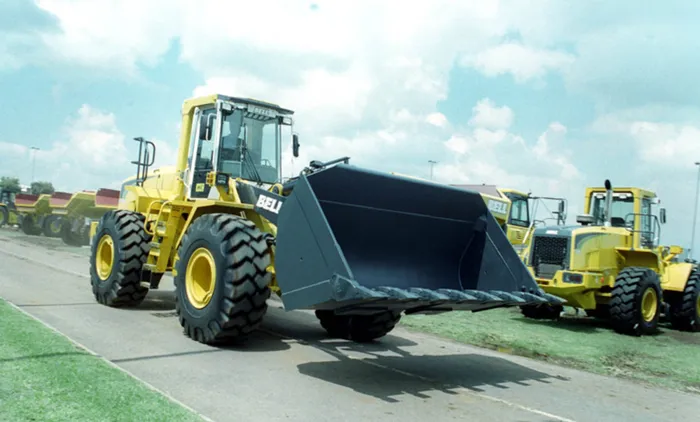Bell Equipment navigates market uncertainty with strong cash flow and cautious outlook
Heavy equipment

A construction vehicle manufacturerd by Bell Equipment. Slowing demand for construction vehicles in the US, and the impact of import tariffs in that country, could have a material impact no the rest of the world market for these vehicles, as most articulated dump truck manufacturers are located outside the US.
Image: Mike Dibetsoe
Bell Equipment, the JSE-listed manufacturer and distributor of materials handling equipment globally, reported a sharp 330% increase in net cash inflow to R487.04 million in the six months to June 30.
The share price gained 2.65% to R41.63 on Friday afternoon, despite the fact that the dividend was passed due to the global slowdown in demand in key markets and a contracted US market due to the current USA tariff situation.
“Just when we anticipated some stability might prevail in our global markets, following a reduction in demand for equipment during 2024 to more normalised levels, the first half of 2025 has been marred with extreme uncertainty in some of our key markets, the US in particular,” the chairman, Gary Bell, and chief executive, Ashley Bell, said on Friday in the results.
Whilst this had exacerbated the impact of the “normal” downcycle on their industry worldwide, the group continued to manage the situation proactively to minimise the impact on its business.
“Under the circumstances, we are satisfied with our overall group result. Our dealership operations in South Africa and Zambia enjoyed better-than-expected demand from these markets, largely driven by expansion in mining projects, despite demand for certain commodities being subdued. We are seeing some positive movement in the construction sector in South Africa,” they said.
Revenue declined by 4% to R6.1 billion from R6.38bn. Profit from operating activities was down by 43% to R302.8m. Profit for the period was lower by 30% to R227.89m.
Headline earnings a share fell by 23% to 248 cents from 321 cents. Net asset value per share by the end of the period was 6 167 cents, up from 5 777 cents at the same time last year.
Gary and Ashley Bell said demand for their agricultural products in Africa had been pleasing, and the growth in distribution of partner product lines across the South African dealer network continued to be a good fit with the group’s OEM product offering.
“Other southern hemisphere markets, such as the Southeast Asia and Oceania region, have been relatively slow for us during 2025,” they said.
Looking to the second half, they said the second half was likely to be more challenging than the first half.
“We will continue to place emphasis on cost containment, cash preservation, and prioritising process improvements that bring operational efficiency and quality enhancement.”
Bell operates in a cyclical industry, and current demand for mining and construction equipment indicated the industry had reached the end of the bottom of the cycle. This, coupled with elevated geopolitical instability, market uncertainty, and exchange rate volatility, necessitated “that we remain cautious in our production and sales planning,” the directors said.
The US makes up about 30% of the global market for construction equipment so a slowdown in this market has a big impact on market dynamics across the rest of the world, with the potential for heightened competition as products are redirected from the US to other markets.
“With most ADT (articulated dump trucks) manufacturers located outside the US and impacted by tariffs, we expect an overall contraction in the US market size whilst consumers adjust to price increases, and as such, we have adjusted our sales and production plans accordingly,” they said.
“However, we are cautiously optimistic that recovery in this market will be swift, as economic stimulus measures are implemented to counter the negative impact of tariffs on the consumer.”
At the factory in Germany, a government-supported ‘short time’ four-day week had been implemented from August due to lower ADT production levels, and this was expected to remain in force into the first quarter of 2026.
“In Richards Bay, our production volumes are supported by the greater resilience we are seeing in some of our key southern hemisphere markets, and we are optimistic that this continues.”
Visit:www.businessreport.co.za